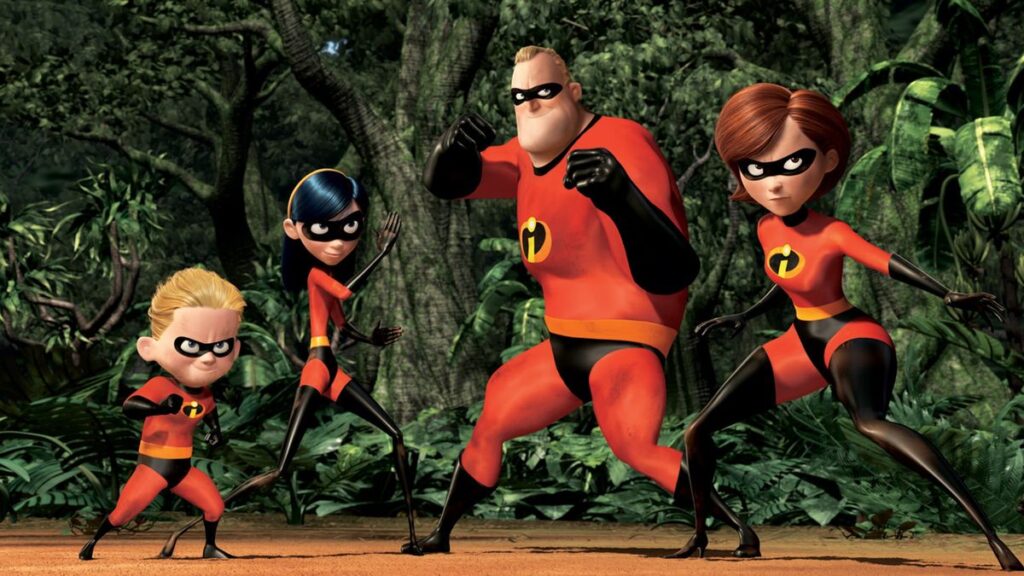Those types of well-observed character moments within superhero action make The Incredibles so special. Part ’60s spy caper, part Fantastic Four homage, with just a bit of Watchmen thrown in, The Incredibles remains one of the best superhero movies ever made. Writer/director Brad Bird‘s keen animator instincts understands how to use the family’s powers for not just visually breathtaking set=pieces but also to explore the depth of his characters. The former Mr. Incredible looks constricted in his cubicle and tie; the one-time Elastigirl, now only Helen, stretches herself to clean the house and cook dinner and take care of the kids; Violet pops into nothingness when she feels too shy; and Dash can barely sit still without exploding into bursts of super-speed.
The best example comes during one of the movie’s most mundane moments. Bob comes home late at night to find a furious Helen waiting for him. It’s the stuff of hundreds of sitcoms and melodramas, only slightly improved by the superhero sheen. Bob downing a giant slice of cake and Helen acting the slighted wife almost becomes disastrously rote. But then Helen uses her stretchy arms to gently pull Bob back to her. When she charges Bob with missing life with their family in pursuit of reliving the glory days, he waves his arms and charges through the living room with the might of Mr. Incredible. Rather than fall back, Helen responds with her own display of power.
“It’s not about you!” she charges, growing taller to punctuate each syllable. Nothing in The Incredibles matches that scene because the powers work to reveal the internal state of the characters. They’re less about superhero excitement than they are the relationships illuminated by these powers.
Family Affiliations
The jungle escape sequence climaxes with a big bad guy monologue from Syndrome. Once a brilliant but overeager kid called Buddy, Syndrome plans to sell his inventions to the world. Sure, he wants to get rich, but he has a deeper motivation. “When everyone’s super, nobody is,” he sneers. Together with Bob’s complaints about feeling unexceptional, Syndrome’s scheme has seemed to endorse a Ayn Rand style philosophy in Bird’s work, arguing that inherently excellent people deserve to step over the rules set for ordinary folks.
Twenty years later, it’s hard to ignore a hierarchy of some sort in Bird’s movies, whether it be the Parrs, Ethan Hunt in Mission: Impossible – Ghost Protocol, or Frank Walker in Tomorrowland. But Buddy’s story has another, equally important motivation. Buddy first meets Bob as a child after he’s given himself the name Incrediboy. Donned in a costume in the style of Mr. Incredible, Buddy hopes for welcome as a sidekick. But again and again, Mr. Incredible rejects him, grouching, “You’re not affiliated with me!”
Buddy assumes that he gets rejected by Mr. Incredible because he lacks powers, but Bob never says that. Instead Bob insists, “I work alone,” an ethos he continues when lying to his family about his nightly activities. In fact, Bob’s arc in The Incredibles is less about figuring out what to do with his exceptional status and more about learning how to be with his family and stop working alone.
Premium IPTV Experience with line4k
Experience the ultimate entertainment with our premium IPTV service. Watch your favorite channels, movies, and sports events in stunning 4K quality. Enjoy seamless streaming with zero buffering and access to over 10,000+ channels worldwide.

















